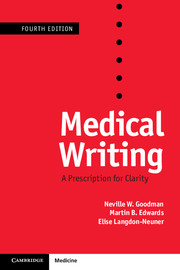Book contents
- Frontmatter
- Dedication
- Epigraph
- Contents
- Foreword
- Preface to the fourth edition
- Layout of the fourth edition
- Preface to the first edition
- Acknowledgements
- Part I Problem: the illness
- Part II Solution: symptomatic relief
- 4 Technology, changing language and authority
- 5 Guidelines to clearer writing
- 6 Spelling
- 7 Is there a better word?
- 8 Superfluous words
- 9 Imprecise words
- 10 Superfluous phrases
- 11 Trouble with short words
- 12 Use of the passive voice
- 13 Consistency: number and tenses
- 14 Word order
- 15 Punctuation
- 16 Circumlocution
- 17 Words and parts of speech for EAL writers
- 18 Clichés and article titles
- 19 Constructing sentences
- 20 Further help with sentences for EAL writers
- 21 Drawing clear graphs
- 22 It can be done
- Part III Practice: recuperation
- Appendix British–American English
- References and further reading
- Index
7 - Is there a better word?
Published online by Cambridge University Press: 05 September 2014
- Frontmatter
- Dedication
- Epigraph
- Contents
- Foreword
- Preface to the fourth edition
- Layout of the fourth edition
- Preface to the first edition
- Acknowledgements
- Part I Problem: the illness
- Part II Solution: symptomatic relief
- 4 Technology, changing language and authority
- 5 Guidelines to clearer writing
- 6 Spelling
- 7 Is there a better word?
- 8 Superfluous words
- 9 Imprecise words
- 10 Superfluous phrases
- 11 Trouble with short words
- 12 Use of the passive voice
- 13 Consistency: number and tenses
- 14 Word order
- 15 Punctuation
- 16 Circumlocution
- 17 Words and parts of speech for EAL writers
- 18 Clichés and article titles
- 19 Constructing sentences
- 20 Further help with sentences for EAL writers
- 21 Drawing clear graphs
- 22 It can be done
- Part III Practice: recuperation
- Appendix British–American English
- References and further reading
- Index
Summary
If words fall into disrepair, what will substitute? They are all we have.
(T. Judt. The memory chalet. London, Vintage, 2011.)A medical writer, when asked why he had used the words ‘were haemorrhaged’ instead of ‘were bled’, replied that he thought haemorrhaged was more scientific. Sometimes we do need to use a term more precise than the one in common usage, but bled is a perfectly good word, and haemorrhaged tells us no more about the process.
Haemorrhaged is also incorrect grammatically. To bleed (COD) can be transitive or intransitive, in other words may or may not have an object: you can bleed someone to death, or you can yourself bleed to death. To haemorrhage is intransitive and so cannot have an object: you can only bleed to death yourself; you can’t haemorrhage someone else to death.
During Alice’s adventures through the looking glass, the birds held a meeting.
‘In that case,’ said the Dodo solemnly, rising to its feet, ‘I move that the meeting adjourn, for the immediate adoption of more energetic remedies –’
‘Speak English!’ said the Eaglet. ‘I don’t know the meaning of half those long words, and what’s more, I don’t believe you do either!’ And the Eaglet bent down its head to hide a smile: some of the other birds tittered audibly.
Resist the urge to use less familiar words. There is danger that the unfamiliar will contribute to confusion; or to put it another way, inflated language often sets out to confuse. Most of the words in the lists that follow can be replaced by words that are more common.
- Type
- Chapter
- Information
- Medical WritingA Prescription for Clarity, pp. 46 - 159Publisher: Cambridge University PressPrint publication year: 2014



